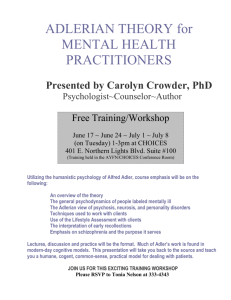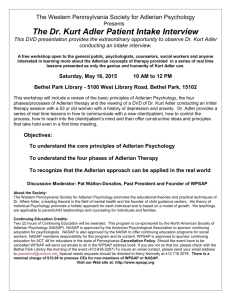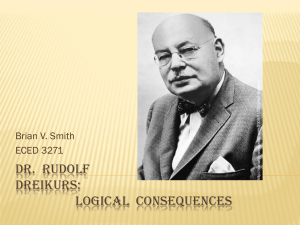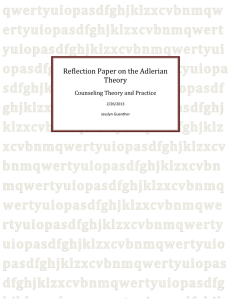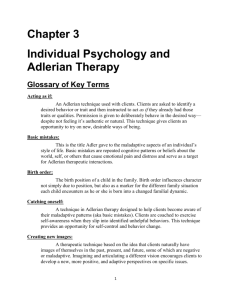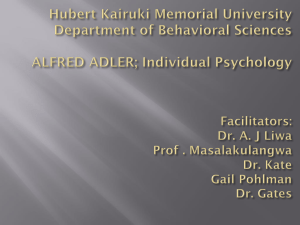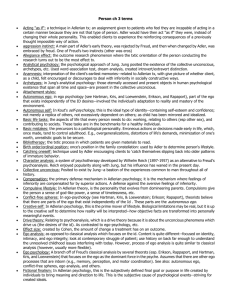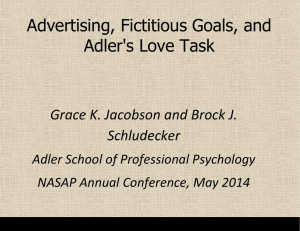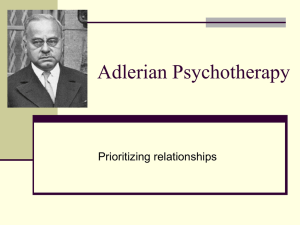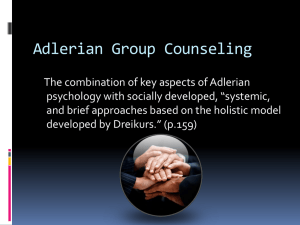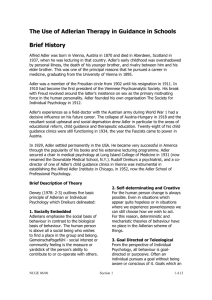chapter objectives
advertisement
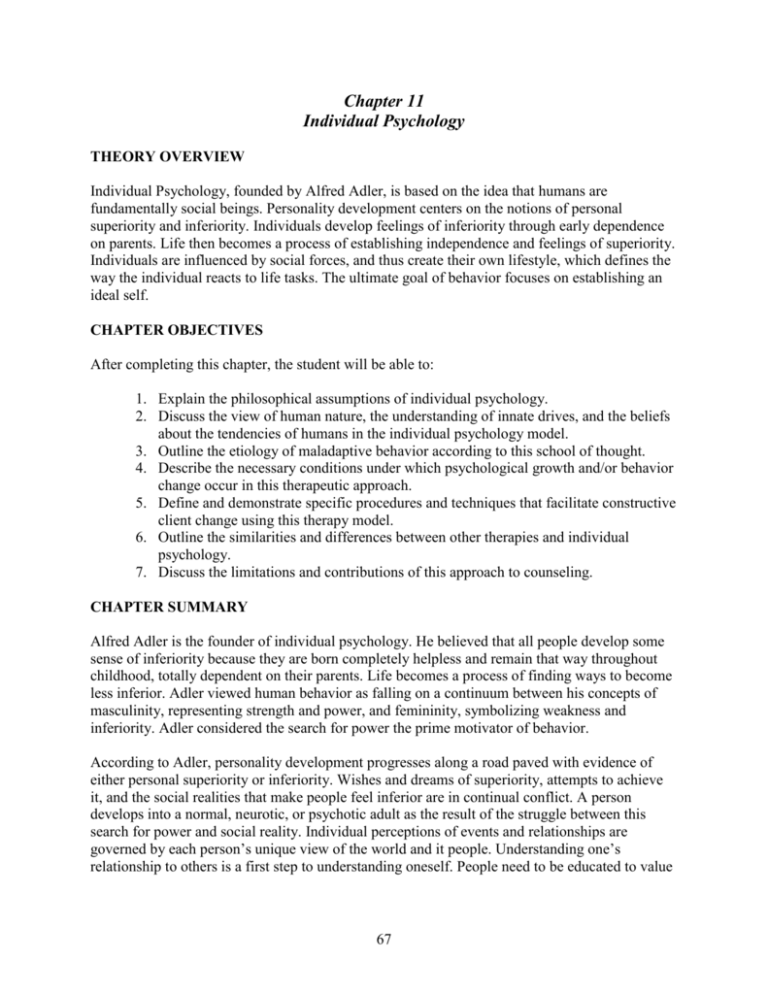
Chapter 11 Individual Psychology THEORY OVERVIEW Individual Psychology, founded by Alfred Adler, is based on the idea that humans are fundamentally social beings. Personality development centers on the notions of personal superiority and inferiority. Individuals develop feelings of inferiority through early dependence on parents. Life then becomes a process of establishing independence and feelings of superiority. Individuals are influenced by social forces, and thus create their own lifestyle, which defines the way the individual reacts to life tasks. The ultimate goal of behavior focuses on establishing an ideal self. CHAPTER OBJECTIVES After completing this chapter, the student will be able to: 1. Explain the philosophical assumptions of individual psychology. 2. Discuss the view of human nature, the understanding of innate drives, and the beliefs about the tendencies of humans in the individual psychology model. 3. Outline the etiology of maladaptive behavior according to this school of thought. 4. Describe the necessary conditions under which psychological growth and/or behavior change occur in this therapeutic approach. 5. Define and demonstrate specific procedures and techniques that facilitate constructive client change using this therapy model. 6. Outline the similarities and differences between other therapies and individual psychology. 7. Discuss the limitations and contributions of this approach to counseling. CHAPTER SUMMARY Alfred Adler is the founder of individual psychology. He believed that all people develop some sense of inferiority because they are born completely helpless and remain that way throughout childhood, totally dependent on their parents. Life becomes a process of finding ways to become less inferior. Adler viewed human behavior as falling on a continuum between his concepts of masculinity, representing strength and power, and femininity, symbolizing weakness and inferiority. Adler considered the search for power the prime motivator of behavior. According to Adler, personality development progresses along a road paved with evidence of either personal superiority or inferiority. Wishes and dreams of superiority, attempts to achieve it, and the social realities that make people feel inferior are in continual conflict. A person develops into a normal, neurotic, or psychotic adult as the result of the struggle between this search for power and social reality. Individual perceptions of events and relationships are governed by each person’s unique view of the world and it people. Understanding one’s relationship to others is a first step to understanding oneself. People need to be educated to value 67 and exhibit social interest. Finally unsolved problems of an individual may become problems for society if they are not treated before they become too difficult to solve. Adler was struck by the hunger for success in human life. Adler’s term style of life emphasizes the direction in which the individual is moving. Style of life analysis involves an assessment of a person’s habitual responses to frustration, to assumption of responsibility and to situations that require exercising initiative. Adler emphasizes the purposive nature of human striving. The issue is not the cause of the behavior but determining what children want to accomplish, either in the real world or in their own minds. By looking at the consequences of a child's behavior, adults can determine the goals of that behavior. Adler emphasized the social as well as the constitutional determinants of a person's style of life. The term individual psychology emphasized the unity of personality that is built from interactions between heredity and environment. Children have developed conclusions about life and the best way to meet the problems life offers. They use these conclusions based on their perceptions of the events and interactions that go on around them to form their life style. The style of life, the beliefs used to help organize, understand, predict, and control one's world, is unique for each individual. It is the pattern of behavior that will predominate throughout that person's life and a pattern that will be unlikely to change without intervention. The study of human interaction is basic to individual psychology. Three environmental factors affect the development of a child's personality: family atmosphere, family constellation, and the prevalent methods of training. Through family atmosphere, children learn about values and customs and try to fit themselves into the standards their parents set. They also learn about relationships and sex roles in the family. The family constellation is the description of how family members interact, the family dynamic and the special place each person has in the family unit. Birth order may impact those variables. Family atmosphere can also be understood as the style of coping with life the family models. Several profiles of family atmosphere are discussed as ways to understand family training. Twelve negative family atmospheres that can adversely affect children are authoritarian, suppressive, rejective, disparaging, high standards, inharmonious, inconsistent, materialistic, overprotective, pitying, hopeless, and martyr. A person's amount of social interest is a good barometer of mental health according to Adler. The feeling for and cooperation with people includes a sense of belonging and participating with others for the common good. Social interest relates to how the individual handles the life tasks of love, friendship, and work in the social context. Although inborn, social interest does not appear spontaneously, but must be encouraged and trained. Adler viewed the counselor's job as helping the child substitute realistic goals for unrealistic life goals and instilling social interest and concern for others. Adler recognized two fundamental styles of life: direct and indirect approaches. Adler thought that talent and capabilities arise from the stimulus of inadequacy. He believed that goals and priorities influence current behavior and that knowledge of these goals is key to understanding behavior. The following four priorities have been identified: (1) The need to please other in order to avoid rejection; (2) The need to be superior to avoid meaninglessness; (3) The need to control oneself, others, and the environment 68 in order to avoid unexpected humiliation; and (4) The need to be comfortable by avoiding stress and pressure. Each goal has a price to be considered. Dreikurs and Soltz analyze the immediate goals by which children behave by classifying goals of misbehavior. Children with no pattern of misbehavior have an immediate goal of cooperation and constructive collaboration. Children with a pattern or misbehavior are usually pursuing one of four mistaken goals: attention, power, revenge, and inadequacy or withdrawal. Understanding the goal for which a misbehaving child is striving helps put the behavior in perspective and provides a basis for corrective action. The Adlerian counselor's job is to reeducate children who have developed mistaken ideas about some concepts of their lives. The counseling relationship assumes that the counselor and child are equal partners in the process and that the child is a responsible person who can learn better ways to meet personal needs. The foremost task of Adlerian counselors is to prove that a person's life is holistic and unified in thinking, feeling, and behaving. Counselors may use an information interview which is included in the text to learn how children remember their early recollections, how the children fit into the family constellation, and how they perceive others in relation to themselves. Early recollections are used to understand the child's earliest impressions of life and how the child felt about them and to uncover the themes in those beliefs. One technique uses steps to determine a child's mistaken goals, to provide a corrective response, and to assess the child's reaction to the correction. Encouragement implies faith and respect for children as they are and Adlerians support using it freely. Natural and logical consequences are techniques favored over reward and punishment in this approach to therapy. Another significant part of Adlerian system is parent education. Adlerian play therapy begins by assuming that the children who have been referred are discouraged children who have negative convictions about themselves and the world. The goal of Adlerian play therapy is the reduction of this discouragement. This type of play therapy has four phases: establishing a relationship, exploring the child’s lifestyle, interpreting the lifestyle and helping the child use the insight and convert it into action. Strategies to facilitate movement through the four phases are discussed. Additionally an outline for Adlerian family counseling is provided. KEY CONCEPTS 1. 2. 3. 4. 5. 6. 7. Human behavior is purposeful and goal-directed. Humans are motivated by a need for success. Early in life, a person draws general conclusions about life and the best way to handle life's problems. The goal of counseling is the establishment of a positive self-concept. The role of the counselor is to reeducate people who have developed mistaken ideas about some concepts in their lives. A person's amount of social interest is a good barometer of mental health. A person's behavior must be studied from a holistic viewpoint. 69 8. 9. Some qualities of the well adjusted child include: respect for the rights of others; tolerance for and interest in others; cooperation; encouragement for others; a strong, positive self-concept; sense of belonging; socially acceptable goals; genuine effort; willingness to share; and concern with common welfare. Goals of misbehavior for children may be understood as a mistaken attempt to gain attention, power, revenge, or to be allowed to withdraw. KEY TERMS, CONCEPTS, and PERSONALITIES Alfred Adler – The founder of Individual Psychology. Adler emphasized human nature as being predominantly social, and individuals as unique beings. Birth order – A child’s position in the family as labeled either first, second, middle, youngest, or only. Community feeling – Feelings that encompass spiritual and universal order in an individual’s life. Early recollections – Childhood memories, prior to age 9, of one-time events. These memories are retained as the basis for an individual’s current philosophy of life. Family constellation – The social and psychological structure of the family system. This includes perception of self, familial relationships, sibling characteristics and birth order. Holism – Studying the individual as a whole; not separating the personality into parts. Inferiority feelings – A force in behavior and the source of human striving. These feelings are based on the child’s early and total dependence on his/her parents. Ordinal position – The exact position of a child in a family; the order of birth (i.e. 2nd, 4th, etc.). Social Interest – Identifying with humanity, the feeling of belonging, and interest in others. Striving for superiority – The inclination to establish independence; engaging in behaviors that yield feelings of perfection and improvement of self. Style of life – An individual’s way of thinking, feeling, and acting. A framework for perceiving the world and coping with life tasks, as established by the child. Teleology – The study of goals and goal-directed behavior. Individuals are driven by goals as opposed to merely reacting to external forces. 70 REVIEW QUESTIONS 1. Which of the following is not an Adlerian concept? A. People behave in ways to achieve feelings of perfection or superiority. B. The focus is on an individual’s goals of behavior. C. One’s lifestyle includes basic beliefs established from early interactions between heredity and environment. D. Social interest is only for the self-actualized person. 2. According to Adler, there are three environmental factors that affect the development of the child’s personality. Which of the following is not one of these factors? A. the family constellation B. social interactions within the community C. the family atmosphere D. all of the above 3. Adler viewed the counselor’s job as including all of the following except: A. helping the client recognize unrealistic goals and substituting realistic life goals B. helping the client to establish a positive sense of self-esteem. C. instilling social interest in the client. D. Interpreting birth order for the child 4. Which of the following birth order positions is characterized as a conforming achiever? A. the only child B. the youngest child C. the first born child D. the second child 5. Which of the following mistaken goals of behavior is characterized by the need to exercise superiority and emerge as the winner in all situations? A. power B. attention C. inadequacy or withdrawal D. revenge 6. Early recollections are best utilized in understanding: A. unconscious motivation for behavior. B. patterns in the lifestyle. C. sibling relationships. D. none of the above 71 7. The family atmosphere which is characterized by parents who do too much for their children and who tend to guard them from the consequences of their behavior is: A. suppressive. B. high standards. C. disparaging. D. overprotective. 8. The basis of teleoanalytic holistic theory centers on which of the following ideas? A. Behavior is a function of early recollections. B. Troublesome behavior is regarded as movement by a unified organism towards personal goals. C. Recognizing negative behaviors and reorienting towards more positive goals. D. Practicing preventive approaches in treating personality problems. 9. Adlerian play therapy has four phases. Which of the following is NOT one of them? A. B. C. D. 10. establishing a relationship doing a genogram exploring lifestyle identifying self-defeating behaviors The most difficult goal of misbehavior for intervention is which of the following: A. power B. attention C. revenge D. inadequacy TRUE/FALSE 1. ____ The study of human interaction is basic to individual psychology. 2. ____ Adlerian counseling makes definite distinctions between conscious and unconscious material. 3. ____ Confrontation is necessary when children are unable to change mistaken ideas behind their behavior. 4. ____ Youngest children tend to develop feelings of superiority. 5. ____ In the authoritarian home, complete obedience is enforced. 6. ____ The basic goal of children is to belong. 7. ____ In a child’s struggle for power, the passive destructive form is referred to as the rebel. 72 ESSAY QUESTIONS 1. With regard to Adlerian theory and individual psychology, discuss the importance of childhood experiences. 2. Explain the significance of birth order, and describe the major characteristics of each of the ordinal positions. 3. Explain the meaning of goals of misbehavior. Describe the four mistaken goals of behavior and how children utilize them. ACTIVITIES 1. Assess your family constellation. Include descriptions of family themes, your role in the family, and birth order and sibling descriptions. Consider your current lifestyle and discuss how your childhood experiences have contributed to the development of your personality. 2. Create an intervention for a teacher to utilize in the classroom with a student who is misbehaving. Your intervention should appropriately address the child’s mistaken behavioral goal. 73
